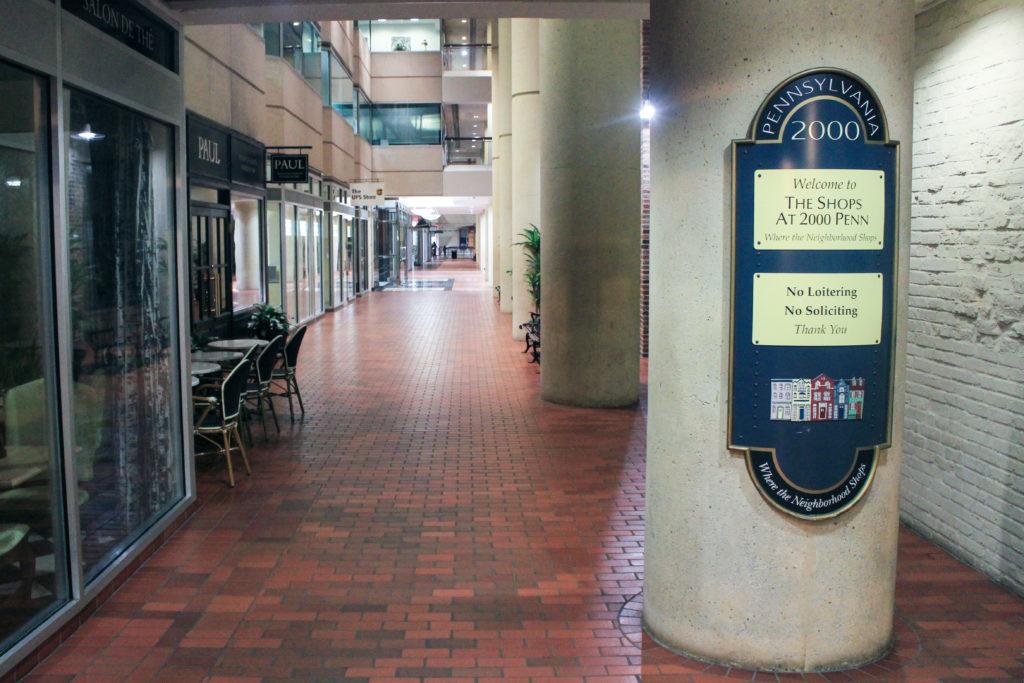When Indian restaurant Bindaas opens this fall in The Shops at 2000 Penn, it will be at least the eighth new business to move into the turnover-plagued complex in the last decade.
Several business have left the complex in recent years, leaving behind some shuttered spaces that have sat empty for years. Store managers in the complex said there are a variety of reasons for the high turnover, including high rents for some businesses and low foot traffic in the building.
In the past 11 years, at least nine shops have closed in the building, and at least four sites are currently available for lease, according to a the Shop’s website. The complex, which GW has owned since 1984, has 23 retail spaces.
University spokesman Brett Zongker said it wasn’t unusual to have several businesses open and close in the complex.
“A continually changing tenant mix is a standard feature of urban retail markets, and the arrivals and departures for some 2000 Penn businesses is an example of this,” he said in an email.
“A continually changing tenant mix is a standard feature of urban retail markets, and the arrivals and departures for some 2000 Penn businesses is an example of this.”
Zongker said after Bindaas signed the lease, GW saw more interest from other potential tenants to rent space in the center. He said officials plan to fill the space left by Kinkead’s, a former seafood restaurant, in the building.
Kinkead’s closed its doors in December 2012 after leasing space at 2000 Penn for 20 years. More than four years later, the space on the second-floor of 2000 Penn has not been filled.
There are two levels of retailers in the Shops at 2000 Penn with business spaces in the upper floors of the complex. GW uses investment money from its ownership of the complex to fund academic programs, University facilities, financial aid and other programs, Zongker said.
GW also profits from owning The Avenue – a retail and apartment complex on I Street – and is planning to merge Rice Hall and 2100 Pennsylvania Avenue into a retail and business development in the coming years.
Zongker declined to say what the process is to lease spaces in the complex, how the University is involved, if rent has increased in recent years, the reasons why tenants have left, how much GW profits every year from the center and why some spaces have not been filled for years. He cited the University’s policy not to discuss leasing matters.
Ashok Bajaj, the owner of Knightsbridge Restaurant Group – the group that owns Bindaas, said he wants to bring his restaurant to the Foggy Bottom neighborhood because he wants a location that is busy during both the afternoon and evening.
Bajaj said he was concerned about the high rent at 2000 Penn, but that it would be a concern at any complex.
“Rent is always a concern, but GW worked with me on the rent, and they were very gracious with working with me on the rent,” he said.
Johnny Rockets closed last February when the restaurant decided not to renew its lease after eight years in the complex. The restaurant is the most recent to close in the complex after Chateau Florist shut down earlier that month.
Current managers of retail spaces in the center said increasing rent, changing management and the lingering effects from the 2008 recession could be pushing tenants out of the center.
Harry Smith, the owner of the UPS Store in the complex, said he had not heard of a rent increase in recent years, but the complex empties out on most weekends and nights.
“Most people go to 14th Street, and this place gets pretty dead,” he said, referring to a popular nightlife destination in the city. “Retail in general is hard at night and on weekends.”
Senior Simone Jackenthal, the assistant manager at Captain Cookie and the Milkman, said rent increases were driving some tenants away.
“As tenants, they are not very cooperative with people that are here because they think they can fill the spots easily,” she said.
Experts said an increase in rent and competition in the area are the most likely causes of turnover for a complex like The Shops at 2000 Penn.
The Shops at 2000 Penn is valued at more than $178.7 million, a $38.7 million increase since 2014, according to city records. The complex is expected to gain almost $8.7 million in value over the next year, records show.
Experts said an increase in rent and competition in the area are the most likely causes of turnover for a complex like The Shops at 2000 Penn.
Melina Cordero, the head of retail research at the real estate firm the Americas at CB Richard Ellis, said retailers usually vie for spots on college campuses, but because GW is located in the city, students don’t have to go to restaurants and stores on campus.
“You can easily hop on a bus or train and go to Georgetown or go to Dupont or go wherever,” she said. “You don’t have the kind of captive audience that’s stuck there that you may have in college towns.”
Brielle Powers contributing reporting.





